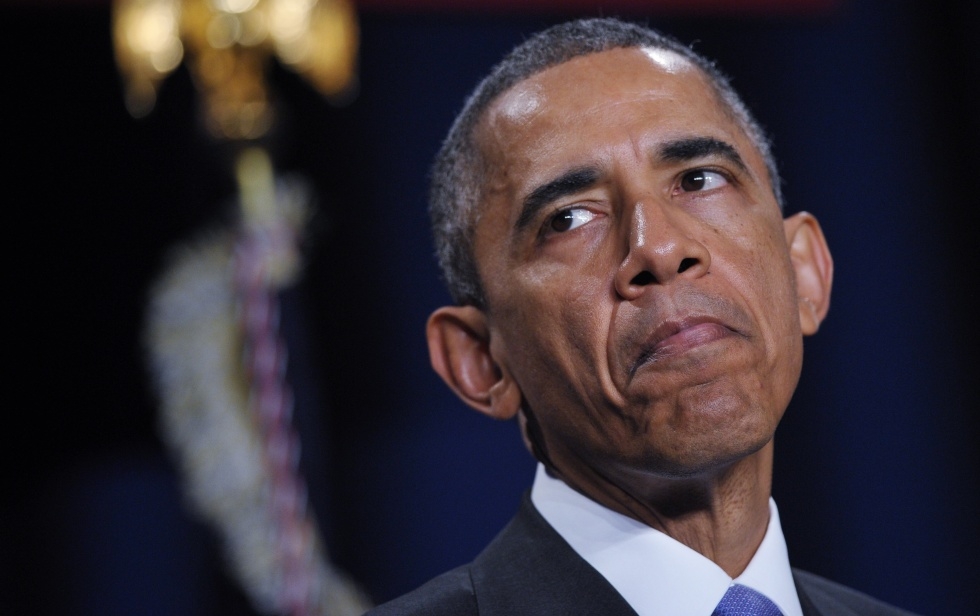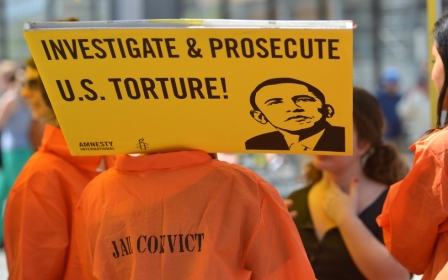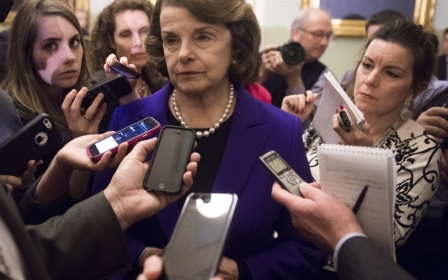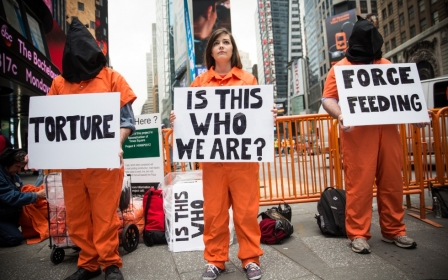
The unmasking of the Obama presidency
With two years of President Obama’s second term remaining in office, his style and accomplishments have formed a distinct pattern in contemporary United States history. It seems an appropriate time to begin an objective assessment of his presidential career.
Obama’s ascent to the American presidency made history. He was the first African-America to reach that office; educated at Columbia and Harvard, where he earned a law degree; his steady rise in politics and election in November 2008 at the age of 47 - all looked impressive and hopeful after eight traumatic years of foreign policy under President George W. Bush.
The rise of Barack and Michelle Obama from modest beginnings was a story of the “American dream” come true. In truth Obama’s book, “The Audacity of Hope,” published shortly before his election, was an assertion of a persistent and overstated belief: for every single American’s dream fulfilled, countless remain unrealised or are shattered, as is the law of nature. In this case, despite some obstacles, a set of favourable circumstances contributed to the making of Barack Obama.
His mother was educated, but unfortunate, with two failed marriages and an untimely death. Obama was born in 1961 when his mother, Stanley Ann Dunham, was 18 years of age. An early divorce, single motherhood and frequent travels meant that family life lacked stability. She died of cancer, aged 53, soon after earning a doctorate in anthropology. Obama spent his childhood in Indonesia with his mother and step-father. His grandparents gave him stability when young Obama needed it most. Scholarships for a private school education and later at Columbia and Harvard followed. But a self-confessed user of cocaine and marijuana in his young age, Obama was no angel.
However, his advance on the career path was steady, taking him all the way to the White House in the November 2008 election. He won the Democratic nomination against Hillary Clinton by a narrow margin. After seven years of The “War on Terror” during George W. Bush’s presidency and the American economy on the verge of collapse, a Democratic victory looked likely. The Republication presidential ticket of two maverick politicians, John McCain and Sarah Palin, gave Barak Obama and his running mate, Joe Biden an easy victory.
Obama’s campaign and eventual victory in November 2008 looked like a peaceful revolution. Enthusiasm for him was high, particularly in the Afro-American and Hispanic communities. American voters of all ages turned out in vast numbers on polling day. Obama’s campaign raised hopes not only in America, but also in other parts of the world. Victory came on the back of soaring rhetoric, with assertions of a “defining moment” of change and the “arc of history” bending “toward the hope of a better day.”
As he celebrated victory, Obama depicted himself as an outsider. In fact, he was a first-term United States senator with a firm foothold in Chicago politics. The Democratic Party machine has maintained a firm grip in Chicago, Illinois state and national politics for decades. Barack Obama was a product of that powerful organisation.
The power of corporate money
He made a great deal of the fact that he did not accept money from federal political action committees or lobbyists. In truth, his presidential campaign was the most expensive in history. According to the Center for Responsive Politics, a record $2.4 billion were to be spent by all presidential candidates, including related expenses. Barack Obama’s campaign expenditure of nearly $750 million easily surpassed John McCain’s. Candidate Obama raised more than twice the amount which his opponent, veteran Republican Senator McCain did.
Modest contributions by ordinary Americans to his campaign were widely publicised. However, as filmmaker Michael Moore revealed in an interview on “The Colbert Report” in September 2009, Goldman Sachs investment bank was “Obama’s No. 1 private contributor”. Only the University of California employees’ collective contributions surpassed those of Goldman Sachs. Among other big donors were employees of Harvard University, Microsoft, Google, Citigroup, JPMorgan Chase, Time Warner and Stanford University. Obama’s campaign financing without matching federal funds illustrated the power of corporate money.
In claiming victory, Obama’s assertion in 2008 was that the source of America’s strength was not the might of arms or scale of wealth, but the enduring power of ideals of democracy, liberty, opportunity and unyielding hope. Obama’s record since entering the White House tells a different story, for he is a man of contradictions. Obama fought the most expensive election campaign as the economy sank into the deepest recession in seventy years.
Double-standards
He had described the Afghan war as a just war, without ever acknowledging that 15 of the 19 hijackers involved in the attacks on 11 September, 2001 were nationals of Saudi Arabia and not one was Afghan. Yet, the Saudi royal family remains a close friend. Further, the United States bore heavy responsibility for what had happened in Afghanistan, turning the country into a haven for the Taliban and al-Qaeda. But remorse was hard to come forth.
On the other hand, Obama criticised George W. Bush’s decision to invade Iraq, calling it a “dumb war”. As president, not only did Obama maintain America’s military presence in Iraq under heavy propaganda cover of “withdrawal”, he escalated intervention in Iraq, Syria, Libya, Yemen, Somalia and elsewhere. Seen in this context, Obama’s 2009 Nobel Peace Prize, announced barely nine months after he had taken office, was premature. Now it is undeserved.
Many of his supporters and admirers had come to believe, mistakenly, that he was averse to war. In office, President Obama has used powers more freely under “the Authorisation for Use of Military Force” – legislation cobbled together by Congress and signed by President Bush only days after 11 September, 2001. It is a vague and sweeping legal instrument which authorises the president “to use all necessary force against nations, organisations, or persons he determines planned, authorised, committed or aided the terrorist attacks on September 11, 2001, … or in order to prevent future acts of international terrorism”.
Drones
The manifold increase in CIA drone attacks during the Obama presidency has attracted wide criticism, including from the United Nations rapporteur for human rights, Ben Emmerson. In a recent report, Emmerson cited a 40 percent rate of civilian deaths among those killed in all air attacks in 2013. Within a year of President Obama taking office in January 2009, the use of drones had peaked in Pakistan. Afghanistan, Pakistan and Yemen bore the brunt, but their deployment rapidly became more widespread, in Algeria, Iraq, Libya, Somalia, Mali and possibly Iran, which claimed to have fired on or disabled pilotless aircraft.
Emmerson says that countries where drone attacks kill civilians are obliged to order inquiries. Extrajudicial killings by drones have attracted widespread condemnation, and generated outrage amongst the communities of victims of the strikes.
American officials told Emmerson that the Obama administration routinely sought prior consent of the concerned government. Yemen’s official version, as reported by the Guardian in March 2014, said that such attacks were not pre-approved. There has been a dramatic reduction in operations in Pakistani territory during the last year, due to pressure from Prime Minister, Nawaz Sharif and the National Assembly of Pakistan in response to unprecedented public anger.
Banning torture?
If CIA drones and extrajudicial killings have raised many legal and ethical questions, the agency’s torture tactics are not far behind. It is worth recalling that immediately after his inauguration, President Obama had signed an executive order (No. 13491) banning the use of torture. The practice had done great harm to America’s reputation under President Bush. A long-awaited Senate report just published has described the CIA’s torture methods as “brutal and ineffective” and accused the agency of lying about the usefulness of information gathered.
The National Security Archive in Washington cites documents showing that senior CIA officers, including directors George Tenet and Michael Hayden, overruled agents who protested against what was being done to prisoners. But after the Senate report, President Obama has attempted to partially justify the CIA torture. He told Spanish television: “When countries are threatened, they oftentimes act rationally in ways that in retrospect were wrong.” As John Brennan, the CIA director and Obama’s close confidant, was preparing to launch a counter-offensive, the president said in further remarks: “I hope that today’s report leaves these techniques where they belong – in the past.”
The Senate report, much of it censored from the public, has not only revealed the crimes and cover-up by America’s vast security apparatus, but it has also highlighted fundamental failures in Obama’s character. His reluctance to allow prosecution of senior officials of the Bush administration amounts to a cover-up itself. Here is a president who does not have the backbone to stand up to offenders in powerful positions. Obama is a political operator par excellence who avoids, evades, overcomes and, if nothing works, just moves on to other things.
Guantanamo and other broken promises
President Obama’s first act, the order banning torture, stated aim was to promote “the safe, lawful and humane treatment of individuals in United States custody … to ensure compliance with the treaty obligations of the United States, including the Geneva Conventions, and to take care that the laws of the United States are faithfully executed.” Further, he promised that the Guantanamo Bay detention camp would be closed within a year.
Wide-eyed, admirers of Obama gloated. Commentators hailed these announcements as the end of Bush era practices of unlawful detention and torture. It seemed like a revolutionary beginning. As Obama’s one-year deadline to close Guantanamo drew closer, opposition in Congress grew. He did not quite stand up to Congress. The Guantanamo prison was not closed, though detainees began to be sent abroad, quietly, reducing their number from about 775 at its peak down to some 136 in early December 2014.
In the latest releases, six Guantanamo prisoners, including four Syrians, one Tunisian and one Palestinian were sent to Uruguay without ever being charged. In Montevideo, President Jose Mujica, who had himself spent a decade in harsh prison conditions under the country’s military dictatorship, said that Uruguay was offering hospitality to human beings who have suffered a terrible kidnapping in Guantanamo Bay. In Washington, the Pentagon said that the United States was grateful to Uruguay.
The Bush administration had found deceptive ways of redefining terms in his “war on terror”. While using the term “war” himself, Bush claimed that those kidnapped and sent to Guantanamo were detainees, not prisoners of war. As they were not regular soldiers, the Geneva Conventions did not apply to them. In the Bush administration’s lexicon, torture became “enhanced interrogation techniques”.
The detention camp was meant to keep the “world’s most dangerous individuals”, though most detainees were never charged of any offence. About half of the Guantanamo prisoners left were cleared for release, but the Obama administration said that many countries were not willing to accept them. Five years after it was supposed to have been closed, the prison remains open.
Frustration and hopelessness led to prisoners going on hunger strike in protest of their continued detention. Obama responded by ordering that they be force-fed, so no more detainees die. Prisoners’ accounts describe the procedure in which a feeding tube is inserted through a hunger striker’s nose down the throat to his stomach. The method is painful and very uncomfortable. The Obama administration says that it is a “life-saving procedure”. United Nations officials call it torture. The “New England Journal of Medicine” has called it “aggravated assault”.
Life of prisoners inside the Bagram military base under American control has attracted less world attention. Several months after Obama supposedly outlawed torture, the German magazine “Der Spiegel” quoted a military prosecutor, saying that the abuse of prisoners at Bagram was such that Guantanamo looked like a “nice hotel”. President Obama finally washed his hands off the US secret prison at Bagram following the uproar over the Senate report. The remaining prisoners were transferred to Afghan and Pakistani custody. Will they be any better?
Ensuring instability in the Middle East
Foreign leaders were killed under America’s watch during the Bush as well as Obama administrations. Saddam Hussein was hanged on 30 December, 2006 after trial with a foregone conclusion. During the Obama presidency, the Libyan leader Muammar Gaddafi met his gruesome death in the desert of Sirte. US warplanes and ships kept a close watch and Obama’s Secretary of State Hillary Clinton egged on militiamen saying that she hoped Gaddafi would soon be killed as armed men hunted him.
President Bush was responsible for the Iraqi state’s collapse. Obama must share responsibility for the Libya state’s disintegration. The counter-revolution in which Egypt’s elected president, Mohamed Morsi was overthrown and the military establishment returned to rule took place while President Obama’s national security adviser Susan Rice was in close touch with the Egyptian military. These acts have ensured that the Greater Middle East will remain a highly volatile region for years to come with consequences going well beyond.
On the domestic front, President Obama’s big idea was an affordable healthcare scheme for all in the United States. ObamaCare, as the scheme is unofficially known, is the result of decades of efforts in Congress and outside to set up a universal healthcare system in America, rather similar to Britain’s National Health Service envisaged after the Second World War. In the face of strong resistance from sections of both Democrats and Republicans in Congress, ObamaCare became law in the end. It is a significant improvement over what was before, though critics say it is complicated. Many right-wingers and libertarians continue to pour scorn, contending that ObamaCare is too expensive, “socialist” or “un-American” - a step which has taken away citizens’ freedom of choice.
President Obama’s second biggest domestic success was his bailout of the auto industry, General Motors in particular. The Centre for Automotive Research, a think tank based in Ann Arbor, Michigan, concluded that had there been no auto industry bailout nearly two million jobs would have been lost in General Motors in 2009-2010 alone if the company had gone under. The collapse of the entire auto industry would have resulted in more than four million job losses. The US federal and state governments would have suffered a hit in excess of a hundred billion dollars. In this respect, Obama can be credited with pulling the economy from the brink.
However, there are other domestic afflictions in American society, notably in areas of race relations, police accountability and gun control. President Obama has singularly failed to confront them. His response to police officers shooting black youths in Ferguson and New York and grand juries refusing to charge the officers concerned has been timid. The Afro-American and Hispanic communities, who made Obama’s victory possible, had hoped for change following his November 2008 victory. Many will say their hopes remain unrealised.
Deepak Tripathi is a writer with a particular reference to South Asia, the Middle East, the Cold War and America in the world. He is a fellow of the Royal Historical Society and the Royal Asiatic Society of Great Britain and Ireland.
The views expressed in this article belong to the author and do not necessarily reflect the editorial policy of Middle East Eye.
Photo: US President Barack Obama speaks at an event for the Senior Executive Service at a hotel in Washington on 9 December (AFP)
New MEE newsletter: Jerusalem Dispatch
Sign up to get the latest insights and analysis on Israel-Palestine, alongside Turkey Unpacked and other MEE newsletters
Middle East Eye delivers independent and unrivalled coverage and analysis of the Middle East, North Africa and beyond. To learn more about republishing this content and the associated fees, please fill out this form. More about MEE can be found here.




